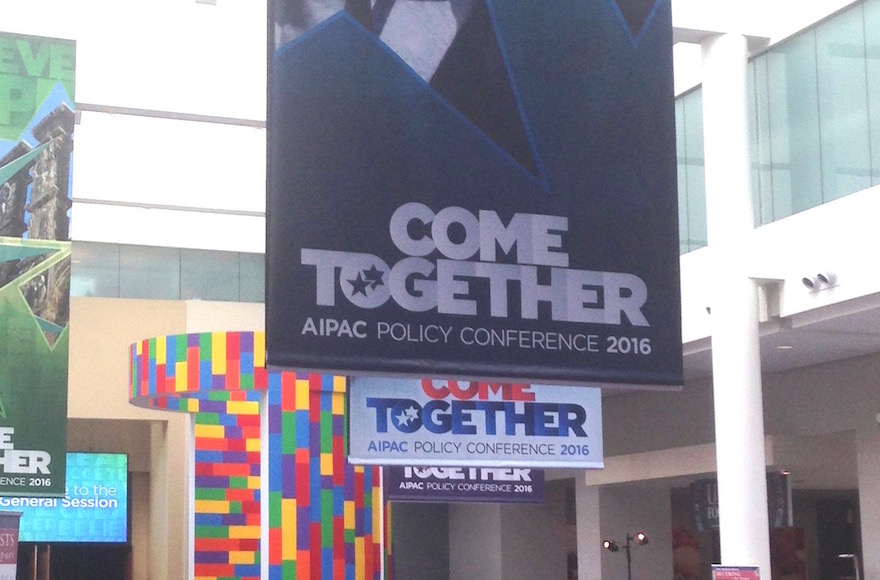
AIPAC’s annual Policy Conference, held March 20-22, 2016, sprawled across Washington’s downtown convention center, above, and its nearby basketball arena. (JTA)
WASHINGTON (JTA) – The American Israel Public Affairs Committee dismissed as “weak” recent U.S. sanctions on Iran for testing ballistic missiles, a sign of continued tensions between the influential lobby and the Obama administration in the wake of the Iran nuclear deal.
“These limited sanctions are too weak to affect Iran’s behavior,” AIPAC said Monday of the new sanctions, which target an industrial group involved in manufacturing the missiles, the missile command of Iran’s Revolutionary Guards Corps, and companies providing support to Mahan Air, which is affiliated with the Guards Corps.
“America must respond to Tehran’s recurring provocations with swift and meaningful penalties,” the prominent Israel lobby said.
AIPAC called for “crippling sanctions” that would “cast a wider net and target entities providing material support to Iran’s illicit ballistic missile program, including within financial and transportation services.”
The AIPAC statement was notable for its rarity both for blasting an action targeting Iran and because AIPAC generally opposes administration policy through the backing of congressional legislation, shying away from public statements.
AIPAC, however, in recent months has not been able to identify bipartisan Iran-related legislation suitable for backing. There are a number of bills backed by either Democrats or Republicans, but AIPAC abjures backing purely partisan bills.
The “crippling” sanctions AIPAC calls for, targeting third parties, are precisely the category that the Iran nuclear deal has for now removed. The Obama administration is unlikely to reimpose them as long as Iran is complying with the sanctions relief for nuclear rollback deal.
U.S. officials, including President Barack Obama, have said the missile testing violates the spirit of last year’s Iran nuclear deal, but say Iran is observing the letter of the agreement.
The U.S. Treasury announced the new sanctions on March 24, months after Iran had tested the missiles, and after weeks of pressure from pro-Israel groups, U.S. allies in the region, and congressional Republicans and Democrats.
AIPAC said the entities named by the Treasury are subsidiaries of already targeted entities, rendering the sanctions “largely symbolic.”
The Treasury often adds subsidiaries and individuals affiliated with already sanctioned entities to its sanctions list as a means of tightening the noose and reminding third parties that it is actively targeting dealings with Iran.
The Obama administration has sought to reassure Israel and other allies in the Middle East that it continues to act against Iran for its hostile actions unrelated to the nuclear deal. On Monday, the U.S. Navy reported that on March 28, it intercepted an Iranian arms shipment for the third time in recent weeks. This time, the shipment was likely bound for Houthi insurgents in Yemen.
JTA has documented Jewish history in real-time for over a century. Keep our journalism strong by joining us in supporting independent, award-winning reporting.





